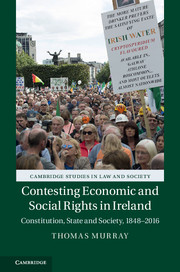Book contents
- Frontmatter
- Dedication
- Contents
- Acknowledgments
- Introduction: The Politics of Economic and Social Rights
- 1 Constitution ‘from Below’ in Ireland: 1848–1922
- 2 ‘Not Alone Personal Liberty but Economic Freedom’: Socio-economic Rights in the Making of the 1922 Irish Free State Constitution
- 3 ‘Highly Dangerous’? Socio-economic Rights in the Making of the 1937 Irish Constitution
- 4 Contesting the Irish Constitution and the World-System: 1945–2008
- 5 The Polarities of Justice and Legal Business
- 6 Contesting Property Rights
- 7 Contesting Trade Union Rights
- 8 Contesting Family, Education, andWelfare Rights
- 9 Reproducing the Value-Consensus State
- 10 Constitution ‘from Below’ in Ireland: 1945–2008
- Conclusion: Contesting Economic and Social Rights Today
- Bibliography
- Index
7 - Contesting Trade Union Rights
Published online by Cambridge University Press: 05 August 2016
- Frontmatter
- Dedication
- Contents
- Acknowledgments
- Introduction: The Politics of Economic and Social Rights
- 1 Constitution ‘from Below’ in Ireland: 1848–1922
- 2 ‘Not Alone Personal Liberty but Economic Freedom’: Socio-economic Rights in the Making of the 1922 Irish Free State Constitution
- 3 ‘Highly Dangerous’? Socio-economic Rights in the Making of the 1937 Irish Constitution
- 4 Contesting the Irish Constitution and the World-System: 1945–2008
- 5 The Polarities of Justice and Legal Business
- 6 Contesting Property Rights
- 7 Contesting Trade Union Rights
- 8 Contesting Family, Education, andWelfare Rights
- 9 Reproducing the Value-Consensus State
- 10 Constitution ‘from Below’ in Ireland: 1945–2008
- Conclusion: Contesting Economic and Social Rights Today
- Bibliography
- Index
Summary
If a highwayman presents a pistol to my head and says, ‘Your money or your life’, he attempts to coerce me, though he gives me a choice of two courses. I may, indeed, adopt a heroic attitude and say, ‘Shoot away’, but if discretion or pusillanimity prevail and I disgorge my money, it seems to me idle to say that I have not been coerced into so doing.
– Judge Kingsmill Moore on workers’ strike action, 1961The judiciary has not recognised that for workers freedom of expression is the picket placard; that freedom of assembly is picketing (and sometimes occupation) of premises; and that freedom to form association and unions means the ability to pursue potentially effective action through collective organisation…The effect of this has been to disadvantage workers as a class. The failure to recognise distinct labour interest is a denial by the judiciary of class difference in Irish society, despite the explicit recognition in Article 40.6.2 of the Constitution of the existence of such differences.
– Brian Wilkinson, ‘A Jurisprudence of Labour Liberty?’ 1989The defeat of the Irish Transport and General Workers Union in the 1913 Dublin Lockout broadly indicated how the balance of class forces in the Irish Free State would reside with the employers, owing partly to the support of an emergent, native class of landowners and partly to the ideological dominance of Catholicism and nationalism. Internally, the labour movement remained divided between the British-based amalgamated unions who advocated continued sectionalist, wage-militant organisation and their less organised colleagues who wanted to formalise labour-state relations along industrial unionist lines in order to increase the unions’ overall bargaining power. During World War II, the latter section of trade unions formed a partnership with Fianna Fáil to modernise industrial relations, a relationship that would endure into the twenty-first century. Prior to the war, unions had to be combative in order to achieve gains. After it, they became ‘part of the social furniture’.
From the 1960s onwards, as Ireland industrialised, this cooperative relationship would translate into ‘national’ pay rounds or voluntary, tripartite wage-bargaining mechanisms. Nevertheless, common to wider European mobilisations, there were periods of heightened wage militancy, notably in the mid to late 1960s.
- Type
- Chapter
- Information
- Contesting Economic and Social Rights in IrelandConstitution, State and Society, 1848–2016, pp. 230 - 244Publisher: Cambridge University PressPrint publication year: 2016



